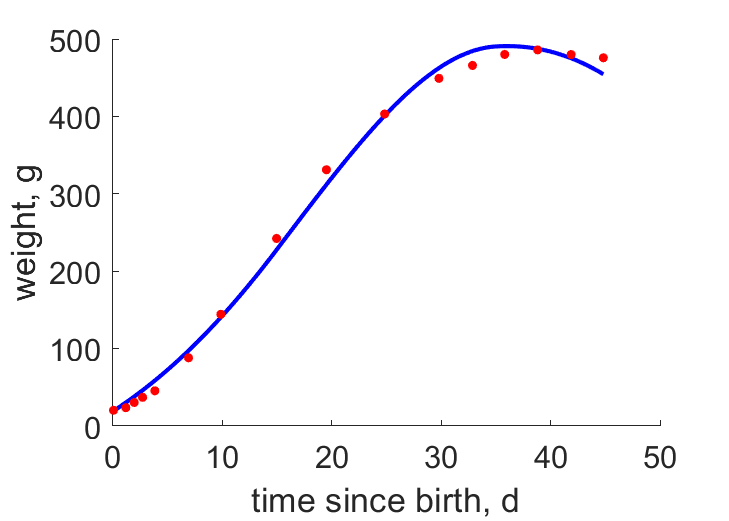Predictions & Data for this entry
| Model: std | climate: A, B, C | migrate: | phylum: |
| COMPLETE = 2.5 | ecozone: TPa | food: biCvf, biCi | class: |
| MRE = 0.039 | habitat: 0iFm | gender: Dg | order: |
| SMSE = 0.003 | embryo: Tnpfm | reprod: O | family: |
Zero-variate data
| Data | Observed | Predicted | (RE) | Unit | Description | Reference |
|---|---|---|---|---|---|---|
| ab | 30 | 31.02 | (0.03411) | d | age at birth | Wiki |
| tx | 80 | 79.58 | (0.005256) | d | time since birth at fledging | Wiki |
| tp | 240 | 218.9 | (0.08781) | d | time since birth at puberty | guess |
| tR | 730 | 730 | ( 0) | d | time since birth at 1st brood | Wiki |
| am | 9125 | 9080 | (0.004948) | d | life span | guess |
| Wwb | 20 | 18.69 | (0.06526) | g | wet weight at birth | WilsWils1988 |
| Wwi | 520 | 574.9 | (0.1056) | g | ultimate wet weight | WilsWils1988 |
| Ri | 0.0137 | 0.01349 | (0.01547) | #/d | maximum reprod rate | Wiki |
Uni- and bivariate data
| Data | Figure | Independent variable | Dependent variable | (RE) | Reference |
|---|---|---|---|---|---|
| tW |  | time since birth | weight | (0.03735) | WilsWils1988 |
Pseudo-data at Tref = 20°C
| Data | Generalised animal | Scopus umbretta | Unit | Description |
|---|---|---|---|---|
| v | 0.02 | 0.02337 | cm/d | energy conductance |
| p_M | 18 | 496.5 | J/d.cm^3 | vol-spec som maint |
| k_J | 0.002 | 0.02147 | 1/d | maturity maint rate coefficient |
| k | 0.3 | 0.3153 | - | maintenance ratio |
| kap | 0.8 | 0.8212 | - | allocation fraction to soma |
| kap_G | 0.8 | 0.8035 | - | growth efficiency |
| kap_R | 0.95 | 0.95 | - | reproduction efficiency |
Discussion
- Body temperature is guessed
- Relative food intake is reduced just after hatch and before fledge
- mod_1: v is reduced
- mod_2: Pseudo-data point k is used, rather than k_J; Data set tp and parameter t_R are added, the latter replacing clutch interval t_N. Postnatal T is based on PrinPres1991, see get_T_Aves. See further the revision page, theme puberty
Bibliography